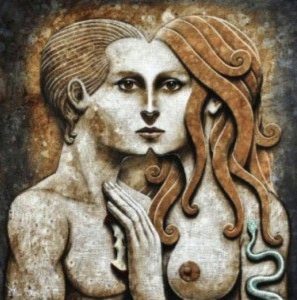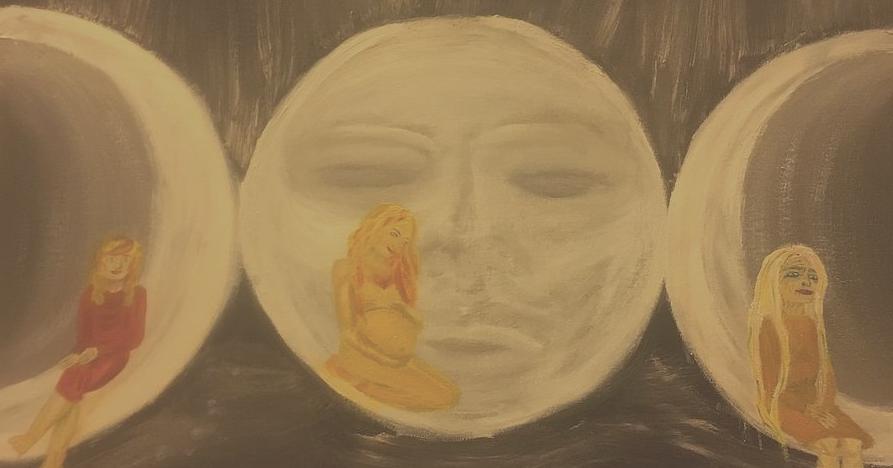In continuing the work on my book manuscript, I have been visiting – or rather re-visiting – ideas on the Masculine and Feminine. I make mention of the importance of re-dressing the balance of these energies throughout the book, and I saw the need to anchor the ideas in a more personal context: it has been fascinating to do so…
I am a gay woman, at least that is the label that I can see the outside world would place on me, and understandably so. I am biologically “woman” and share my life with another woman. But what is it to FEEL “gay”? My biology and sexuality combined don’t define the phenomenology of my lived-experience. Perhaps this relates to my sense of gender. Biologically woman, and comfortable with that. Gender, somewhere more toward androgynous. As I write this, I don’t feel any sense of confusion. In coming to trust my direct experience, none of this feels contradictory. There is a sense of self, “what it is to be Helen”, that transcends labels. And through this, I know I live in congruence; I feel true to my Self.
What has been perplexing, and remains so, is placing my journey in the context of Jungian archetypes and a relating to the anima and animus. But if anything, NOT being able to pin something down has encouraged and supported the fluidity and letting go of self as something solid and inherently existing. Technically, Jung would say as a woman my contra sexuality is masculine and governs my rational thinking function – the Animus. But as a gay woman who identifies as more gender neutral, where does this leave me? In being more in the middle of a continuum, does this move me toward a contra sexuality which is feminine in nature – the Anima? Does it matter?
Certainly, what IS important is that the psyche contains and embraces both the feminine and masculine; inherently psyche is an androgynous entity regardless of what the gender of the physical person is. What I have come to take from this is the dynamic balance of anima and animus is central to wholeness, and to individuation.
 As I consider my life history, a sense of ‘stages’ emerges. My partner (now wife) and I met some 18 years ago. At that time, I accepted the labelling of society as “gay woman” (I have never liked nor identified with the label lesbian, even writing it I get an all over body cringe). As I grew into living life as a “gay woman” something else began to emerge – I might add being in a relationship with another woman acted like a sort of container that nurtured an alternative sense of self. Not simply an identity, but a more congruent expression of who, on some level, I knew I already was. My childhood self knew it; I spent many years trying to conform. It is only in the last 10 years that this inner shifting popped to the surface, or at least close enough to become graspable. Three key happenings come to mind. The first was attending the wedding of partner’s sister. Both my partner and I wore skirts, and I remember feeling so uncomfortable, and not just because we were a gay couple attending a catholic family wedding. I came home knowing I would never wear a skirt again. The second memory is housed within the weekly conversations with the counsellor I was seeing during the early days of my therapy training. A gay woman herself, she helped me unravel biology, sexuality, gender: what those words meant to me, and what I needed to consider in order to live the trajectory of “Helen” congruently. The third memory is being in the Brooklyn apartment of a friend. As we prepared dessert, I saw a little mouse run across the kitchen floor, and on making a joke about ‘ani-mouse’ my friend exclaimed “its a sign for you to find your anima!”. It became a koan for me to ponder, and I threw myself into Jungian psychology and an exploration of archetypes, shadow, and the feminine.
As I consider my life history, a sense of ‘stages’ emerges. My partner (now wife) and I met some 18 years ago. At that time, I accepted the labelling of society as “gay woman” (I have never liked nor identified with the label lesbian, even writing it I get an all over body cringe). As I grew into living life as a “gay woman” something else began to emerge – I might add being in a relationship with another woman acted like a sort of container that nurtured an alternative sense of self. Not simply an identity, but a more congruent expression of who, on some level, I knew I already was. My childhood self knew it; I spent many years trying to conform. It is only in the last 10 years that this inner shifting popped to the surface, or at least close enough to become graspable. Three key happenings come to mind. The first was attending the wedding of partner’s sister. Both my partner and I wore skirts, and I remember feeling so uncomfortable, and not just because we were a gay couple attending a catholic family wedding. I came home knowing I would never wear a skirt again. The second memory is housed within the weekly conversations with the counsellor I was seeing during the early days of my therapy training. A gay woman herself, she helped me unravel biology, sexuality, gender: what those words meant to me, and what I needed to consider in order to live the trajectory of “Helen” congruently. The third memory is being in the Brooklyn apartment of a friend. As we prepared dessert, I saw a little mouse run across the kitchen floor, and on making a joke about ‘ani-mouse’ my friend exclaimed “its a sign for you to find your anima!”. It became a koan for me to ponder, and I threw myself into Jungian psychology and an exploration of archetypes, shadow, and the feminine.
I mention three memories above, but there is another that feels deeply significant. As a child, I delighted in being a Tomboy. I knew where I belonged and how to be. Boys weren’t just my best friends, I didn’t feel different to them. Then one day, my mum bought me a bag, lavender in colour. On it “Daddy’s little girl”. I can only have been six or seven. A well-intended gift and YET it conveyed a message. When I remembered this only recently, there was an accompanying memory of the felt-confusion of the time. “Am I?” the little girl queried, something of my Tomboy innocence was pierced. Self-concept replaced Self. And by puberty, ‘innocence’ became a sort of naivety. I took on the burden of conforming to societal discourse – what I should be and should do. I lived as a woman and did all the things a ‘woman’ should. The trajectory of my childhood had continued into adult life; one that coalesced around script and obligation, head rather than heart. Dutiful daughter, dedicated girlfriend, conscientious student, diligent academic, driven athlete. Career, relationship, settling down. I stopped short of becoming a mother, and I am grateful that life circumstances prevented having children for the wrong reasons. Cue mid-life: “crisis”? Perhaps more the first glimpses of ‘waking up’. I credit meditation with cracking open my heart; the beginning of making a relationship with life that held the qualities tenderheartedness, kindness, compassion, nurturing. The more I let go of concepts, drive, responsibility, the better* wife, daughter, friend, therapist I become.
As I go through menopause, the paradox is I am coming to truly know womanhood for the first time. This biological transition is mirrored by other ‘mini-deaths’: Becoming a Vajrayana practitioner, living through the pandemic. I am finally coming to arrive at a place where I no longer need to prove myself; a place where I trust my experience more than the knowledge I have accrued. I am a late convert to feminism, moving within patriarchal environments such as sport and academia have kept the blindfold in place. In contemporary society, women are held back from maturing, encouraged to stay diminished rather than find autonomy. And maybe I also needed the maps of Jungian psychology and Buddhism to navigate, and honour masculine and feminine principles and fully open to their co-existing energies.
While I don’t fully relate to the ‘maiden, mother, crone’ stages of womanhood, I can see some overlap in my process. The girl who was shaped into how to be; a woman who felt marginalised for being childfree. My therapy and teaching work have enabled me to find other ways of offering nurturance and care to others, and so I now sense I am not too far off the transition to the next phase, the crone (again, another word I don’t like – I much prefer ‘sage’!).
Since embarking on this book project 3 years ago, a lot has happened. Its been like a portal in which I have come to really find my voice and value what I can offer to others on the path to individuation. To not talk about the masculine and feminine as part of my own journey – even with its challenges of disclosure and boundaries – would feel inauthentic.
————————-
*shorthand for spontaneous, freer, kinder, creative, receptive

